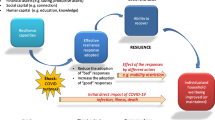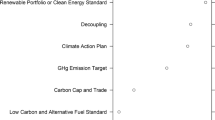Abstract
Purpose of Review
This paper presents new insight on the approaches and ability to respond to climate-related security risks in four regional intergovernmental organizations (IGOs) in Asia and Africa—ASEAN (South East Asia), SAARC (South Asia), ECOWAS (West Africa), and IGAD (East Africa).
Recent Findings
IGOs are becoming increasingly important in responding to climate-related security risks, given the transnational character of these risks. Previous research has primarily focused on Western-based IGOs, whereas more attention is needed on IGOs in fragile and developing regions to increase our understanding of the emerging challenges and to take adequate measurements to mitigate climate-related security risks.
Summary
We show that the regional security context and vulnerability to climate change affects the framing of climate-related security risks, and that the risks identified often relate to livelihood conditions and development, rather than state security. Measurements are taken, but the key challenge remains the implementation of these policies.
Similar content being viewed by others
References
Papers of particular interest, published recently, have been highlighted as: • Of importance •• Of major importance
Elmhagen B, Destouni G, Angerbjörn A, Borgström S, Boyd E, Cousins SAO, et al. Interacting effects of change in climate, human population, land use, and water use on biodiversity and ecosystem services. Ecol Soc. 2015;20:art23.
Adger WN, Eakin H, Winkels A. Nested and teleconnected vulnerabilities to environmental change. Front Ecol Environ. Wiley-Blackwell; 2009;7:150–7.
•• Dellmuth LM, Gustafsson M-T, Bremberg N, Mobjörk M. Intergovernmental organizations and climate security: advancing the research agenda. Wiley Interdiscip Rev Clim Chang. 2018:e496 This is the first comprehensive review of the literature on IGOs responses to climate-related security risks.
Bremberg N. European regional organizations and climate-related security risks: EU, OSCE and NATO. sipri.org. Solna; 2018.
Mobjörk M, Gustafsson M-T, Sonnsjö H, van Baalen S, Dellmuth LM, Bremberg N. Climate-related security risks. Solna: Stockholm International Peace Research Institute; 2016.
• Oels A. Rendering climate change governable by risk: from probability to contingency. Geoforum Pergamon. 2013;45:17–29 This article applies Foucault’s concept of governmentality to explore changes in the risk management of climate change.
• Zwolski K, Kaunert C. The EU and climate security: a case of successful norm entrepreneurship? Eur Secur. 2011;20:21–43 This is an excellent article that analyses the development of EU as a global actor on climate security.
Conca K. An unfinished foundation. Oxford and New York: Oxford University Press; 2015.
•• Conca K, Thwaites J, Lee G. Climate change and the UN Security Council: bully pulpit or bull in a China shop? Global Environ Polit. 2017;17:1–20 This article presents and discusses six proposals derived from academic and policy literature on what actions the UN Security Council could take on climate-related security risks.
•• Scott S, Ku C. Climate change and the UN Security Council. London: Edward Elgar Publishing; 2018. This edited volume involves 12 chapters that examine the scope and options for the UN’s Security Council to respond to climate insecurity.
Hall N. Moving beyond its mandate? UNHCR and climate change displacement. J Int Org Stud. 2013;4:91–108.
Adger WN, Barnett J, Hovelsrud GK, Levy MA, Spring ÚO, Vogel CH. 12 human security. Climate change impacts, Adaptation, and vulnerability. Part A Global and Sectoral Aspects. Contribution of Working Group II to the Fifth Assessment Report of the Intergovernmental Panel on Climate Change. Cambridge and New York: ipcc.ch; 2014. p. 755–91.
McDonald M. Discourses of climate security. Polit Geogr Pergamon. 2013;33:42–51.
Trombetta MJ. Environmental security and climate change: analyzing the discourse. Camb Rev. Int Aff. 2008;21:585–602.
Dalby S. Security and environmental change. Cambridge: Polity; 2013.
Ruttinger L, Smith D, Stang G, Tänzler D, Vivekananda J. A new climate for peace. adelphi, International Alert, Woodrow Wilson International Center for Scholars, European Union Institute for Security Studies; 2015 pp. 1–172.
German Advisory Council on Global Change. Climate change as a security risk. London and Sterling: Earthscan; 2007.
Barnett J. Security and climate change. Global environmental change. Pergamon. 2003;13:7–17.
Barnett J, Adger WN. Climate change, human security and violent conflict. Polit Geogr. 2007;26:639–55.
Gemenne F, Barnett J, Adger WN, Dabelko G. Climate and security: evidence, emerging risks, and a new agenda. Clim Change. Springer Netherlands. 2014;123:1–9.
Gilmore EA. Introduction to special issue: disciplinary perspectives on climate change and conflict. Curr Clim Change Rep [Internet]. 2017;3:193–9. Available from: https://link-springer-com.ezproxy.its.uu.se/article/10.1007/s40641-017-0081-y
McDonald M. Climate change and security: towards ecological security? International Theory. Cambridge University Press. 2018;10:153–80.
Birkmann J, Teichman von K. Integrating disaster risk reduction and climate change adaptation: key challenges—scales, knowledge, and norms. Sustain Sci. 2nd ed. Springer Japan; 2010;5:171–184.
Steinbruner JD, Stern PC, Husbands JL. Climate and social stress: implications for security analysis. Washington, D.C.: National Academies Press; 2012.
Matthew RA. Integrating climate change into peacebuilding. Climatic Change. Springer Netherlands. 2014;123:83–93.
Adger WN. Climate change, human well-being and insecurity. New Polit Econ. Routledge; 2010;15:275–92.
• Floyd R. Global climate security governance: a case of institutional and ideational fragmentation. Conflict, Security & Development, vol. 15. Abingdon: Routledge; 2015. p. 119–46. This article critically scrutinizes the institutional fragmentation of global security governance.
Mason M. Climate Insecurity in (Post)Conflict Areas: The Biopolitics of United Nations Vulnerability Assessments. Geopolitics. 2014;19:806–28.
Displacement HN. Development, and Climate Change. London: Routledge; 2016.
Kelman I. Climate Change and the Sendai Framework for Disaster Risk Reduction. Int J Disaster Risk Sci. 2nd ed. Beijing Normal University Press; 2015;6:117–27.
Magnan AK, Schipper ELF, Burkett M, Bharwani S, Burton I, Eriksen S, et al. Addressing the risk of maladaptation to climate change. Wiley Interdisciplinary Reviews: Climate Change. John Wiley & Sons. Inc. 2016;7:646–65.
Swatuk LA, Wirkus L, Krampe F, Thomas BK, da Silva LPB. Introduction: theorizing the boomerang effect, Larry Swatuk, Lars Wirkus, Florian Krampe, Bejoy K. Thomas, Luis Paulo Batista da Silva. Water, Climate Change and the Boomerang Effect: Unintentional Consequences for Resource Insecurity. Routledge; 2018.
Gerring J. Case study research. Cambridge and New York: Cambridge University Press; 2006.
George AL, Bennett A. Case studies and theory development in the social sciences. Cambridge: MIT Press; 2005.
Haas PM. Do regimes matter? Epistemic communities and Mediterranean pollution control. Int. Org. Cambridge University Press. 1989;43:377–403.
Haas PM. Introduction: epistemic communities and international policy coordination. Int. Org. The MIT Press; 1992;46:1–35.
Richards D. Elite interviewing: approaches and pitfalls. Politics. Blackwell Publishing Ltd. Hoboken; 1996;16:199–204.
Krampe F, Gignoux S. Water service provision and peacebuilding in East Timor: Exploring the socioecological determinants for sustaining peace. 2018; Journal of Intervention and Statebuilding. 2018;2:185-207.
Krampe F, Scassa R, Mitrotta G. Responses to climate-related security risks: regional organizations in Asia and Africa. SIPRI Insights in Peace and Security [Internet]. Solna: Stockholm International Peace Research Institute; 2018. Available from: https://www.sipri.org/publications/2018/sipri-insights-peace-and-security/responses-climate-related-security-risks-regional-organizations-asia-and-africa
Le Billon P. The political ecology of war: natural resources and armed conflicts. Polit Geogr. 2001;20:561–84.
Beevers MD. Peacebuilding and natural resource governance after armed conflict. Cham: Palgrave; 2019.
van Baalen S, Mobjörk M. Climate Change and Violent Conflict in East Africa: integrating qualitative and quantitative research to probe the mechanisms. Int Stud Rev [Internet]. 2017. Available from: https://academic.oup.com/isr/advance-article-abstract/doi/10.1093/isr/vix043/4616607?redirectedFrom=fulltext
Krampe F, Swain A. Human development and minority empowerment. In: Richmond OP, Pogodda S, Ramovic J, editors. The Palgrave Handbook of Disciplinary and Regional Approaches to Peace. Basingstoke; 2016.
Author information
Authors and Affiliations
Corresponding author
Ethics declarations
Conflict of interest
The authors declare that they have no conflict of interest.
Additional information
This article is part of the Topical Collection on Climate Change and Conflicts
Rights and permissions
About this article
Cite this article
Krampe, F., Mobjörk, M. Responding to Climate-Related Security Risks: Reviewing Regional Organizations in Asia and Africa. Curr Clim Change Rep 4, 330–337 (2018). https://doi.org/10.1007/s40641-018-0118-x
Published:
Issue Date:
DOI: https://doi.org/10.1007/s40641-018-0118-x




